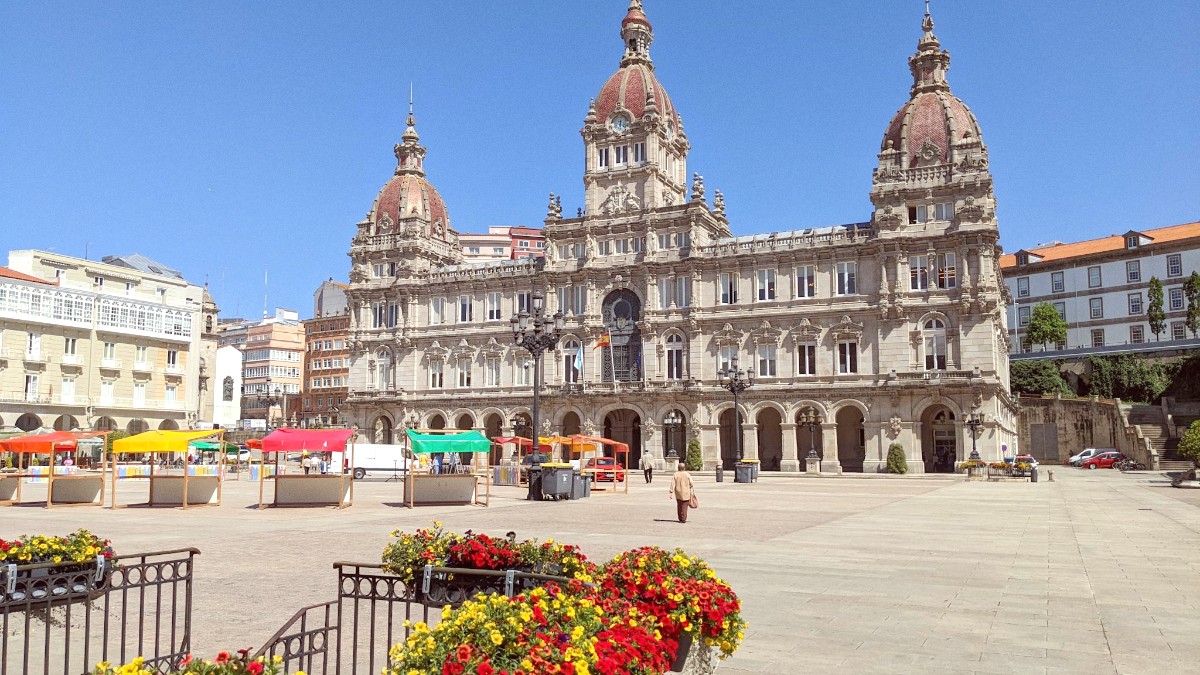
Cantabria Asturias And Galicia, Spain
Average temperatures range from 16°C to 22°C (61°F to 72°F) in summer, with moderate humidity. Rainfall is less frequent but can occur. Sea breezes keep conditions comfortable, rarely exceeding 25°C (77°F). This period displays the warmest, most stable weather.
Temperatures cool to 12°C to 18°C (54°F to 64°F) in autumn. Rainfall increases significantly. September and October often rank as the wettest months. The landscape turns lush and green. Winter temperatures remain mild, ranging from 8°C to 12°C (46°F to 54°F). Frost and snow are extremely rare. This season brings the most rain. Spring temperatures gradually rise from 10°C to 16°C (50°F to 61°F). Rainfall decreases compared to winter but remains common.
La Coruñan is prone to Atlantic storms and consistent rainfall, especially outside of peak summer. Travelers pack a waterproof jacket. Fog appears commonly, specifically in coastal areas during specific conditions, yielding a mystical feel to the landscape.
This region’s climate differs from the more commonly imagined sunny Spanish stereotype, leaning into a verdant, oceanic charm.
July-August
Attractions and services operate fully. Numerous festivals and cultural events occur. Beaches are perfect for swimming and sunbathing.
Higher prices for accommodation and flights. Larger crowds gather at popular sites and beaches.
May-June & Sept-Oct
Pleasant temperatures, fewer crowds than high season. Lower prices. Enjoy lush green landscapes. This period is good for outdoor activities without excessive heat. September often offers good weather for swimming. You find a balance of good weather and fewer tourists.
Increased chance of rain, especially in autumn. Some seasonal businesses might have reduced hours or close by late October.
Nov-April
Significantly lower prices. Very few tourists. You can experience local life authentically. Enjoy a cozy atmosphere in city cafes and restaurants. This period is good for cultural visits.
Coolest and wettest weather. Shorter daylight hours. Some attractions may have limited opening times. Fewer outdoor activities are possible. Beaches are not suitable for swimming.
Spain belongs to the Schengen Area. Non-EU/EEA/Swiss citizens typically require a Schengen visa for stays exceeding 90 days within any 180-day period. For shorter tourist stays (up to 90 days), many nationalities are exempt. Citizens of the United States, Canada, United Kingdom, Australia, New Zealand, Japan, South Korea, and many Latin American countries do not require a visa for tourism or business stays up to 90 days.
From mid-2025 (exact date subject to change), visa-exempt travelers obtain an ETIAS authorization prior to their trip. This is not a visa but a pre-travel screening similar to the U.S. ESTA. It costs €7 and is valid for three years or until the passport expires. Check the official EU website for the most up-to-date information on its implementation.
Valid for at least three months beyond departure, issued within 10 years, two blank pages.
Confirmed ticket showing your exit from the Schengen Area.
Evidence of sufficient funds for your duration of stay (e.g., bank statements).
Hotel bookings or invitation from a host.
Mandatory for Schengen visa holders; recommended for all travelers. Min. €30,000 medical coverage.
Understand the local currency and typical expenses to manage your travel budget effectively in La Coruña.
The Euro (€) is the currency. ATMs (Cajeros automáticos) are widely available and generally yield the best exchange rates. Major banks like Santander, BBVA, La Caixa, and Abanca are prevalent. Avoid currency exchange offices in tourist areas, as they often have unfavorable rates.
Estimates provide a general idea; actual costs vary based on your choices and the season.
Implement these strategies to manage your travel budget in La Coruña.
Prioritize your health and safety when traveling to La Coruña. Spain holds good healthcare, and preparation aids a smooth trip.
No specific vaccinations are required for Spain. Routine vaccinations (MMR, DTP, Polio, Flu) are up-to-date.
Risk is low. Practice good hand hygiene. Tap water is safe in La Coruña.
Sun protection is useful, use High SPF sunscreen, hats, stay hydrated.
Emergency Number: 112 (Europe-wide for police, fire, ambulance).
For EU citizens, the European Health Insurance Card (EHIC) grants access to state healthcare. Non-EU citizens: travel insurance with comprehensive medical coverage comes highly recommended. Public hospitals provide treatment for serious emergencies.
Pharmacies (Farmacias), with a green cross sign, give advice for minor ailments and dispense many over-the-counter medications.
Food hygiene standards in Spain are high. Eat at reputable establishments. Seafood is fresh; ensure proper cooking.
Highly recommended for all travelers. A comprehensive policy covers medical emergencies, trip cancellation, lost luggage, and delays. World Nomads, SafetyWing, and Insubuy are options.
General Emergency: 112. National Police: 091. Local Police: 092. Medical Emergencies: 112. For lost passport, contact your embassy. For lost credit cards, contact your bank immediately.
Tap water in La Coruñan is generally safe and potable. You can drink it without concern.
La Coruñan is considered a very safe city with low crime rates.
For flight delays or cancellations, you could be entitled to compensation. Check your eligibility.
AirHelp assists passengers in receiving up to €600 in compensation for delayed or canceled flights. This service yields 15-16.6% commission with a 45-day cookie duration.
VisaHQ is a direct visa and passport service. Plan your travel with confidence, managing required documentation smoothly.
IVisa offers consumer visa application services. This platform can streamline your visa acquisition process for various destinations worldwide.